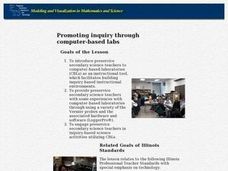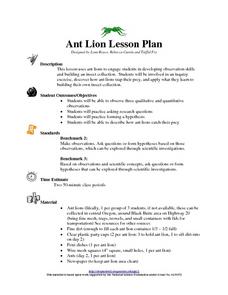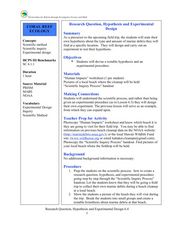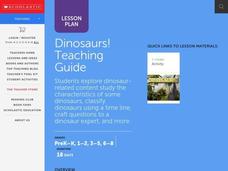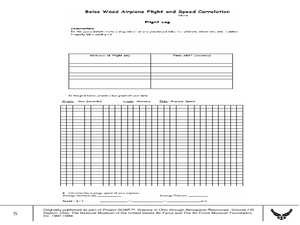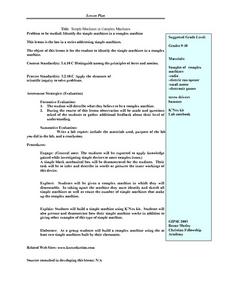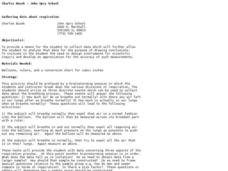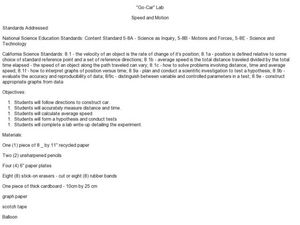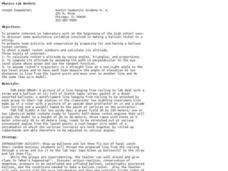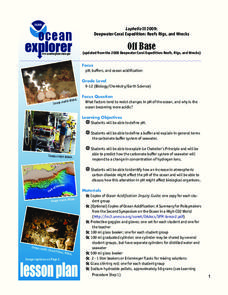Discovery Education
Motion in the Ocean
How do temperature changes affect ocean currents? Scholars explore convection currents by demonstrating the flow of water in a baking dish. They use ice, heat, and food coloring to see currents. Then, they draw conclusions about their...
K20 LEARN
Civil Rights for All: Civil Rights Movement
The Civil Rights Movement was only the beginning. Using images and a series of queries, learners consider current fights for equality. After viewing video clips profiling the women's rights movement, the American Indian Movement, and...
Digital Public Library of America
African American Soldiers in World War I
Finding good primary source materials to support any study of history can be a challenge and time-consuming. A set of 11 primary source letters, images, and text excerpts provide young historians with an opportunity to sharpen their...
University of California
Hellenistic Culture
It doesn't take long to change the world! Alexander the Great's reign may have been short-lived, but his vision for a multi-cultural Hellenistic world shaped Afroeurasia for centuries. Pupils examine documents, such as excerpts from...
Curated OER
Promoting Inquiry Throught Computer-Based Labs
Student Teachers are given the opportunity to examine how to use a computer-based laboratory for inquiry. The practice is done to teach future teachers how to use these tools so they can be ready for use in the classroom environment.
Curated OER
Scientific Inquiry: Periodic Motion
Students construct their own pendulum. In this physics activity, students design an experiment to find the factors affecting its period. They formulate a conclusion based on experimental data.
Curated OER
Ant Lion Lesson Plan
Students observe three qualitative and quantitative observations. The students further practice the follwoing: asking research questions,forming a hypothesis, and describe how ant lions catch their prey. Students also form hypotheses...
Curated OER
Research Question, Hypothesis and Experimental Design
Learners discuss steps of the scientific process, as well as, observe a picture of the beach that they will visit. Students create a testable hypothesis about marine debris at the beach. In this science lesson plan, learners create a...
Curated OER
Dinosaurs
Students will develop goals for inquiry. They will also improve content area reading and research skills. The context of studying dinosaurs will help learners to distinguish from organisms that live presently and those from the past...
Curated OER
Balsa Wood Airplane Flight and Speed Correlation
Ninth graders calculate the average speed of their balsa wood airplane. For this physics lesson, 9th graders build their own airplane and make necessary modifications to to make it fly straight. They interpret distance and time graph...
Curated OER
I Wood if I Could
Tenth graders investigate the process of how specific products are made from trees. For this chemistry instructional activity, groups of students must choose among ice cream, bubble gum, paper, toothpaste and lipstick. They research,...
Curated OER
The UPS Experiment
Students calculate the speed using metric measurements. In this geometry lesson, students calculate speed, distance and velocity using metric measurements. They gain inquiry and problem solving skills in this assignment.
Curated OER
Simple Machines In Complex Machines
Students brainstorm the concept of a machine. They make lists of the characteristics that all machines share. The teacher uses questioning in order to get students to think more deeply about the subject. They create a lab to demonstrate...
Curated OER
Gathering Data About Respiration
Students engage in an experiment that tests how much air we breathe in and out during the respiration process. For this respiration lesson, students blow a typical breath's amount of air into a balloon. They use a ruler to measure the...
Curated OER
"Go-Car" Lab
Young scholars construct a car based on directions given. In this physics lesson, students calculate average speed using distance and time information. They collect data and create a graph of distance vs. time.
Curated OER
Where in the World is Carbon Dixoide?
Students conduct experiments designed to detect the presence of CO2 by using a BTB that changes color (blue to yellow) in the presence of CO2. First, students experiment with the CO2 from combining vinegar and baking soda. In part two,...
Curated OER
Rocks Up!
Students will design and build a structure to support a rock. Students will use their knowledge of movement of objects to determine the proper base to be built to support their rock. Students will explore their natural area for...
Curated OER
Termitology
Students engage in an inquiry-based study of the ecology of termites. Through hands-on investigations, they explore the life cycle of termites, the termite's role in the food web, and the unique social structure of termite colonies.
Curated OER
Discovering Chemical Changes
Fourth graders predict what happens in a teacher demonstration of a chemical change, before watching it. They observe the demonstration and list what the see on the board before determining which represent chemical change. Working at...
Curated OER
The States of Matter
Students apply an inquiry based approach to classic experiments to foster their knowledge and appreciation for the properities of matter. At the conclusion of the instructional activity, they gain knowledge about the properities of...
Curated OER
Physics Lab Rockets
Students construct and test balloon rockets and a model rocket. In this rocket science lesson, students use an inquiry-based method to master balloon rockets and have a shoot-off with the goal of attaining the highest altitude. Next,...
Curated OER
Galactic Inquiry
Young scholars view NASA images of galaxies and develop a galaxy classification scheme. They compare and contrast their classification scheme with that developed by Edwin Hubble. They recognize that galaxies are collections of billions...
Curated OER
Off Base
High schoolers explain the Chatelier's Principle. In this pH lesson, students identify factors that resist changes in pH of the ocean and why the ocean is becoming more acidic.
Curated OER
The Man Who Mistook His Wife for a Hat
Four scenarios of unusual human behaviors are given to your psychology class. Based on their knowledge of brain anatomy and function, they consider what parts of the brain might be affected in order to result in the behaviors. This case...
Other popular searches
- Inquiry Based Learning
- Inquiry Based Cell Biology
- Inquiry Based Physics
- Inquiry Based Science
- Inquiry Based Math
- Inquiry Based Language Arts
- Inquiry Based Math
- Inquiry Based Learning
- Inquiry Based Instrumental
- Inquiry Based Learning Maths
- Inquiry Based Science
- Inquiry Based Physics Motion






